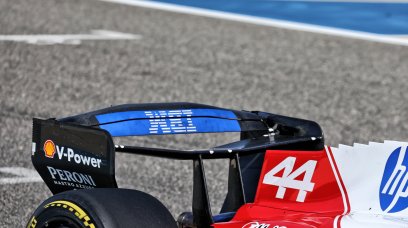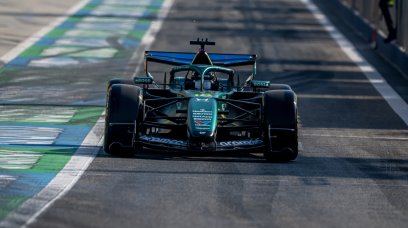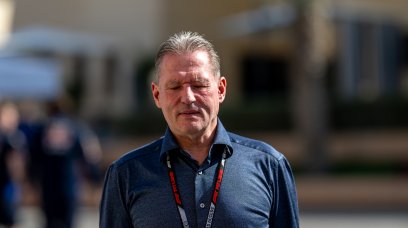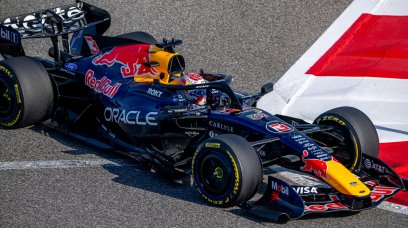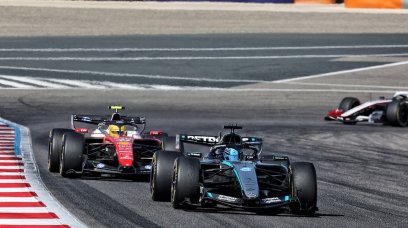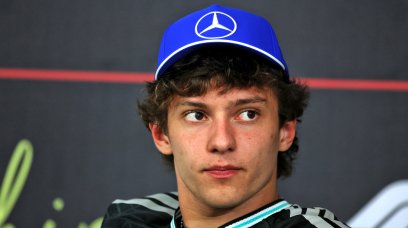The Saudi Arabian GP, taking place just one week after Bahrain did not have many ingredients of particular importance from a technical point of view, with the exception that the Jeddah Corniche Circuit was characterized by a layout radically different from Sakhir. This implied, as an obvious consequence, a different aerodynamic configuration of all the cars with low-downforce wings, in some cases extreme, in favour of increasing maximum speeds in fast corners and on straights. The car that adopted the most extreme rear wing was the Mercedes W15, with the version introduced in Saudi Arabia characterized by the upper profile being decidedly placed very high, implying a very reduced incidence of the flap. This element, moreover, was connected to the main profile laterally by two mini vertical supports, to minimize the drag generated. On the other hand, the choice made by Ferrari was more conservative, or rather, a compromise between efficiency and, with the rear wing characterized by an unloaded flap, but it was not an extreme version - an example of which had also been brought but was not used.
Ferrari less extreme than Mercedes
On the other hand, the adoption of a beam wing with a single element is interesting. In essence, as mentioned, the compromise sought by the Maranello engineers was to maintain an induced load on the rear axle to favour traction when exiting corners. A choice that worked overall, but which (consciously) led to a lower effectiveness of the SF-24 in overtaking during the race. This is the analysis from a purely technical point of view of the solutions adopted by the teams on track, which confirmed the level of competitiveness already seen in Bahrain, with Red Bull untouchable (at least for now) at the front and Ferrari second-best. But it is worth moving away from the current technical landscape to address a topic that could have a disruptive effect, capable of reshuffling the cards during the season: the ongoing earthquake that is shaking Red Bull.
Red Bull's dream team
In Milton Keynes, things are far from calm with the latest developments in this power struggle suggesting that Motorsport Advisor Helmut Marko would be suspended. Tensions in the team are currently running very high, with only the dominant one-two finishes on-track bringing an element of normality to the team. Given the trouble, it is therefore not surprising that rival teams have started to test the waters of potentially hiring Red Bull's technical staff, with Adrian Newey and Pierre Wache high in demand - especially from Ferrari. The difficulties around both potential transfers remain high, evidenced by the failed approaches of recent times, but they could become attainable if there was a real implosion of the Christian Horner-led team. But alongside the big names like Newey and Wache, it is considered far more likely that other prominent figures could be tempted to leave, with what could be described as an 'attack on thr magic circle' of engineers working closely with the duo. Ferrari would be potentially interested in at least three such figures, who are key engineers and who are responsible for the developments planned for the RB20 and know the evolutionary paths and time it would take to deliver such upgrades. It is a wealth of information that appeals to many, especially with a view to 2025 and 2026, and another factor that would make these potential signings less complex is the shorter duration of gardening leave that would need to be served compared to the lengthy period Wache as Technical Director would be required to do so. Looking at Maranello, the reinforcement of the technical ranks, with less prominent figures, but in a shorter time, could be a valid strategy, without however completely abandoning the idea of the big coup. That remains the idea of bringing Newey to Ferrari - but without placing restrictive conditions on him, like moving to Italy. Newey is the resource that Horner is trying to hold onto at all costs, even in the case that Max Verstappen does leave the team early as he has indicated before his contract expires in 2028.
SF-24 rear low downforce wing but not extreme
In Saudi Arabia, the SF-24 adopted a rear wing characterized by a flap with reduced incidence, but not extreme in this sense, using the more loaded version of the two available. In parallel, the beam wing adopted was made up of a single element. This is a compromise for efficiency on the straights and for traction on corner exit.
W15 extreme low downforce rear wing
Both of the Brackley cars have adopted a low downforce externe version of the rear wing. Characterized by a very low incidence of the flap, connected to the very raised wing profile, via two mini vertical lateral supports, the idea is to reduce drag.
Most read
